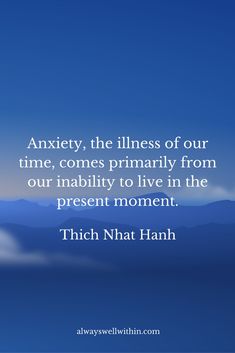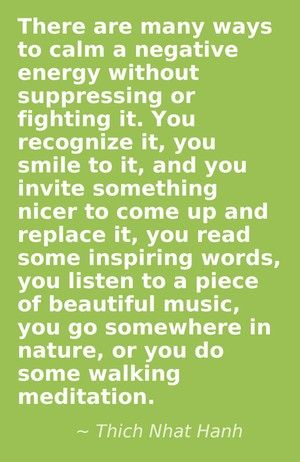Following on from my last post How to Worry Less and Feel Happier, I’ve found taking action to be one of the greatest tools in overcoming anxiety. Not just any old action, but relevant, specific action.
Firstly, when you feel those nervous, jittery anxious (or however they present for you) feelings coming on, take a break from whatever it is you’re doing – even a few minutes is enough. If you’re at your place of work, go outdoors if possible (as long as it’s a safe place) and if not, find somewhere away from others as much as possible. Even a toilet break is good, if it’s a quiet place. If you’re at your home or a friend’s home do the same. If you’re in a public place and there’s absolutely nowhere to be quietly by yourself, that’s ok, as you can create the quiet, alone space in your mind – it’s just a little easier if you can find a space physically as well.
Now you’ve made a safe place for yourself, whether physically or (only) mentally, the following are types of action you can take to lessen your anxiety and bring yourself back to a state of calm and feeling in control of yourself and your emotions. I recommend you try each of them, one at a time, so you’ll have various techniques to draw on each time your anxious feelings arise.
Acknowledgement:
Acknowledge your feelings. Take a slow, deep-ish breath and say to yourself, ‘I notice I’m feeling ……………… and that’s ok’. Simply observe it – don’t judge it, fight it or try to get rid of it. Anxiety isn’t bad, or wrong. After all, it’s simply a feeling. Yes it can feel unpleasant or worse, but that will depend on each situation at the time and on how much you’ve (a) recognised it and (b) learnt skills such as these to deal with it. Acknowledging and accepting it’s ok and perfectly normal will start changing your brain from fear, to kindness towards yourself and sometimes will be enough to alleviate it on the spot.
Positive Statements:
For me, saying positive statements alone does not work to relieve my anxiety, but combining them with Acknowledgement and Breathing, I find them helpful. I tend to favour (on the in breath) ‘I calm my body’ and (on the out breath), ‘I calm my mind’ or, ‘I calm my body’, ‘I relax’. This is what helps me but you can choose any short, positive statements that are comfortable for you. I also find it helpful to gently tell myself, ‘I can handle it’ and ‘This too shall pass’. Even though I may not believe those statements at the time, I say them anyway as I find they do have a somewhat calming effect as I focus on the words and my breathing.
Breathing:
It always works for me but each person is different. I sit, or stand if sitting is not an option, and either close my eyes or stare straight ahead if closing your eyes not possible at any time (perhaps you may be on public transport or a similar situation). Now bring your attention to the air coming in through your nostrils and out through same. You can count one, two, three on the in breath and same on the out breath. (or whatever count is comfortable to you – but don’t make it too long). Focus on your breathing in this manner for 10 repetitions or, one-two minutes. If your focus moves away from your breathing, don’t be concerned, just as soon as you notice, bring your attention back to your breath.
Walking:
Taking time out from what you’re doing to go for a short, (5-10 mins can be enough) brisk (but not too fast) walk is always helpful for relieving anxiety. Outdoors is preferable but if not possible, choose somewhere indoors and even walking up and down a passageway or around a living room is helpful. If indoors and you have a trampet/mini trampoline/bouncer, or treadmill, walk on that. Bring your attention to your feet stepping out (or up and down if on a bouncer) and notice how it feels as each foot touches the surface beneath you. Keep your focus on your feet and legs as they move, while, if outdoors, noticing the air on your face, maybe the sun on your skin, and the feelings of your whole body moving as you walk. The point is to walk and not think of anything except walking, in this present moment. Of course if you’re a regular exerciser, you can walk for longer or do your favoured type of exercise, however, in times of extreme anxiety you may be very tired and a gentle, slow or brisk walk may be more suitable.
QiGong or Yoga:
Although Yoga is an ancient and effective practice, I prefer QiGong and Tai Chi. Both are excellent practices for physical, mental and spiritual well-being.
Tai Chi takes time to learn and can be a little difficult to follow if you’re not experienced in it, but QiGong is much simpler and it’s easy to do with some of the YouTube videos. Even 5-10 mins of doing a QiGong routine is extremely beneficial for anxiety, stress management and even depression. I like Jeffrey Chand at Think Vitality and his ‘Easy QiGong Routine for Anxiety and Stress’ is so very powerful. I practice QiGong daily and will continue to until the end of my days!
Grounding:
If possible and if it’s not too cold where you are, go outside and stand barefoot on the earth. Your garden, your nature strip in front of your home or office, in a park, at the beach – anywhere you can get your bare feet onto the natural earth. Practice your breathing while you’re there and notice how your feet feel firmly placed on mother nature’s glorious earth. Even better if you can lie down (clothing ok, you don’t need to be naked) flat on your back and feel that magnificent connection with the earth supporting and calming you. Grounding regularly, even for 5-10 mins per day is extremely effective at calming your body and nervous system. (For further info you may like to check out Dr Laura Koniver’s research on grounding).
EFT/ Tapping.
This didn’t work well for me for many years. Mind you, it was in the days when I hadn’t recognised or acknowledged I suffered from ongoing anxiety and I wasn’t particularly open to it. That was in the early days of EFT being introduced as a method of healing mind and body and to me, it seemed over complicated. These days, EFT/ tapping has come a long way, both in research, proven positive results and the practices. I recommend Nick Ortner at The Tapping Solution or for a really simple practice, David Childerley who has plenty of short YouTube videos you can follow. I particularly love ‘I am safe, secure, calm and confident’ and find it calms me quite quickly in the short term and has been helpful in eliminating my anxiety overall.
Guided Meditation:
If not caught up in severe anxiety, I find guided meditations helpful for stress management but at times of (past) severe anxiety where I was out of control, couldn’t breathe and in a state of sheer panic, the last thing I could do was to be quiet enough to listen to a guided meditation, or meditate. However now I don’t suffer with anxiety, I do find some guided meditations calming, grounding and pleasant. I like Mindful Movement on YouTube.
Music:
Listening to music in times of severe anxiety didn’t work for me, neither did dancing. At those times I hated any and almost all noise and I didn’t have the energy for strong movement like dancing. I couldn’t listen to my favourite rock music and relaxation and classical music just annoyed me even more. Now, minus anxiety, I adore listening to my favourite music again. If listening to music helps you to feel less anxious then it’s a great way for you to take action. Make sure it’s uplifting and not dark – you don’t want to be stimulating your brain with negativity that can make you feel more anxious.
As you learn to bring your thoughts and your focus back to this very moment, you’re not worrying and fretting about your past or future and all these methods are teaching and reprogramming your brain to feel calm and confident, rather than anxious and overwhelmed. In time you’ll notice when anxieties arise, you’ll calmly deal with them and should you suffer with ‘melt downs’ (as I used to call my times of severe anxiety) you’ll return much more quickly to a state of inner peace and calm.
Of course, there is so much more to eliminating anxiety totally from your life – such as diet/nutrition, regular exercise, enjoying a healthy lifestyle and your work, family, friends and the big one – not putting excess pressure on yourself to be and achieve perfection, but these simple steps I’ve talked about here can put you on the right path and ease your suffering, starting right now.
To sum in up simply in easy steps –
Notice your anxiety.
Acknowledge it – don’t judge.
Take action – until it eases and you feel back in control of your emotions.
Keep practicing Mindfulness and Meditation and your other chosen Stress Management techniques regularly – they’re as necessary as breath, food, water and sleep for good mental, emotional and physical health.
Well, that’s been my experience anyway and with these practices in place, for myself and countless others, Every Day Gets Better. 😊💛


I don’t how I missed this when you first published it, Wendy. Sorry about that. Thank you – very helpful suggestions. Even just the first one, acknowledging your feelings, can make a huge difference. I guess it’s the first step toward learning how to manage feelings that seem uncontrollable. Thank you again! xx <3